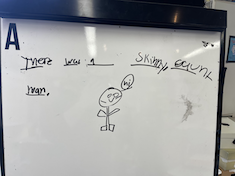David Pittman
David Pittman has been in education for 10 years, mainly as a fourth-grade teacher and curriculum writer. He is currently an instructional coach for an elementary school in the suburbs of Chicago.
All Content
Building Thinking Classrooms in Literacy
Inspired by Peter Liljedahl’s Building Thinking Classrooms in Mathematics, David Pittman applies instructional practices to get students thinking for themselves as readers and writers, and to be drivers, not consumers or mimickers of someone else’s way of doing things.
Visual Data for Literacy
When data was flying and difficult to corral, David Pittman sought to create a tool for teachers to use that would encompass all pieces of data as well as align with shifts in instruction. David shares the process of developing a useful tool that honors student learning and provides clarity for next steps for growth.
PL…See? Lightening Up PLCs to Increase Engagement
David Pittman reminds us of the importance of curiosity in driving professional learning communities. If engagement is waning in your PLCs, this article is a must-read!
Leveraging AI in Elementary Literacy
David Pittman offers practical and time-saving tips for using AI to help make instructional plans. Need a rubric or discussion questions? David shows how using AI offers a springboard for creating tools for elementary literacy instruction.
Making PLCs Public
David Pittman offers several ways to make the work of PLCs visible to everyone. The more open we are with our growth, the more connections we make, the stronger every educator becomes.
Coaching to Empower
David Pittman addresses the unintended messages coaches send when they are too eager to help. David offers practical suggestions to ensure coaching validates and encourages rather than disempowers teachers.
Building Consensus Through Connection
David Pittman led a divided staff in determining a list of classroom instructional agreements. Rather than becoming contentious, the committee found consensus through connection and understanding. David shares the process for establishing common ground and respect for colleagues while completing the task.
Student Voices First
David Pittman offers practical ways to place student voices first in classrooms in order for their passions, interests, and identities to influence our teaching.
Routines That Normalize Mistakes
We all know that mistakes are part of learning and that safe environments for risk-taking allow students to grow, but how do you take the sting out of making mistakes? David Pittman offers advice on ways to normalize mistakes in math.
Coaching Minute: Taking Time to Plan
David Pittman encourages the importance of instructional coaches taking the time to plan.
Capturing Classroom Currents
David Pittman shares how to capture the current of energy from teacher to student and student to teacher in this guide to make the classroom currents visible to teachers.
Give Yourself Time to Prepare
David Pittman encourages instructional coaches to take time to prepare for the day and then to reflect at the end of the day.
Yes, and . . . A Collaborative Philosophy
David Pittman explains the improv roots of the phrase “Yes, and . . .” and applies it to a coaching conversation that will lift professional conversations to a new level.
Remaining Connected as a Coach
David Pittman offers practical advice and inspiration for instructional leaders to intentionally connect to students on a school-wide scale.
Coaching Minute: Welcoming Students as an Instructional Coach
David Pittman reflects on ways instructional coaches can help create an atmosphere of belonging for students.
What Does Your Feedback Say About Your Coaching Relationships?
David Pittman guides literacy leaders to consider the kinds of feedback they offer and what it reveals about their professional relationships.
And Other Duties As Assigned…
David Pittman shares the importance of a principal-coach agreement and offers guiding questions to get started.
Ninja Feedback: Empowering Teachers to Reflect
Instructional coach David Pittman is inspired by the pop culture ninja and considers three types of “ninja feedback” to empower teachers to reflect on their instruction and assessment data.
Offer a Mirror: How Coaches Empower Reflection
David Pittman unfolds a coaching process to provide teachers with a mirror so they can reflect deeply and discover their next instructional moves.
Welcome Slides Set Professional Learning in Motion
David Pittman uses welcome slides to set a purpose and orient participants to the professional learning session.
Harnessing the Power of Change
David Pittman reflects on the change cycle and determines ways to make the best of it.
Measure for Measure
David Pittman thinks through what really matters and nourishes him as well as the teachers he serves when it comes to assessing his impact as a literacy coach.
Saying No
When David Pittman says no to a task outside his coaching role, he shows a commitment to his priorities. David describes the tension and nuances of saying no, and the effect it can have on coaching relationships.
Coaching in PLCs
David Pittman takes teachers in a PLC through a student-centered experience to help them understand a specific standard.
Establishing Trust
David Pittman is stunned when he offers help and teachers are hesitant to take it. He realizes he has lost their trust, and sets out to regain it.
Prioritizing Presence
David Pittman realizes he can’t begin a coaching cycle until he “prioritizes presence,” becoming a welcome and trusted addition to a teacher’s classroom community.
Priming the Pump
David Pittman explains the importance of beginning summer work with teachers by creating collective visions through images and quotes.
Investing in Coaching Logs
After initial skepticism, David Pittman discovers coaching logs are an essential tool in planning, organizing, and documenting his work with teachers.
Brain Dumps for Clarity in Coaching
Too much email, too much paper, just too much. David Pittman finds “brain dumps” are a useful tool for helping teachers sift through and clarify what’s important to work on with a literacy coach.
Portfolios for the Coachee
This is an idea you’ll want to try if you’re a literacy coach. David Pittman creates simple and elegant portfolios with the teachers he coaches of their work together, documenting plans, milestones, and final reflections.
Integrating PD into the School Calendar
Nothing takes the wind out of a coach’s sails more than flat PD sessions. David Pittman realizes the problem sometimes isn’t what is offered, but when it is provided. He works to create a calendar for the year that reflects the ebb and flow of teachers’ stress levels.
Equitable Coaching
David Pittman is asked about the needs of primary teachers in a leadership team meeting. He suddenly realizes he has spent more time with intermediate teachers. This experience sets him on a quest to be more equitable with his coaching time.
Understand, Uncover, and Undertake
David Pittman works with a teacher who is overwhelmed by all the notebooks, forms, calendars, and notes she is taking to document and assess student progress. He helps the teacher streamline and organize a new system tailored to her needs and strengths.
Reframing Data Discussions
David Pittman humorously conveys the dread he experiences when he is assigned to lead an inservice session focused on data. He then finds creative ways to reframe the discussion.
Analyzing Student Work: Beginning with Strengths
David Pittman coaches a fifth-grade teacher to look beyond the sea of grammar and spelling errors in student work, and instead start with strengths to analyze where to go next in instruction.
Pick a Poem
David Pittman delights in a student’s enthusiasm for poetry, leading him to reflect on how teachers often need to overcome their own negative history with poems to spark student love of the genre.
The Lion Unit
Uh-oh. A teacher pulls out her tried-and-true lesson plans for a unit on lions, and David Pittman wonders what his role will be as her literacy coach.
Clearing the Plate: Helping Teachers Feel Free, Not Full
David Pittman is stunned when a teacher he is coaching begs off from more work together. The experience helps him reassess how he collaborates with overwhelmed colleagues.
The Third Rail: Coaching and Instructional Assessment
David Pittman finishes a coaching cycle with a teacher and realizes his hesitancy to evaluate the teacher during his classroom visits hinders any celebration of the teacher's growth during their time together.
Outreach by Reaching Out
David Pittman begins a morning resenting bus duty, and ends with insights into how literacy coaches can use chance encounters to build connections with families.
Know Their Story
David Pittman finds that a teacher is dismissed as a veteran, which can be code for good luck getting that one to change. What he discovers is someone with a rich life and history beyond the classroom that is worth tapping into.
You’ve Done It. What Happens Next?
David Pittman shares the unspoken questions new literacy coaches will ask themselves or will face from teachers in their new role.
Student Centered and Teacher Driven: Coaching and Instructional Assessment
David Pittman tackles the "third rail" of literacy coaching: assessing instructional quality.
Coaching in Proximity: The Sherpa Mind-Set
David Pittman finds that a sherpa analogy helps him adjust his role as a coach—moving closer to teachers without taking over instruction.







